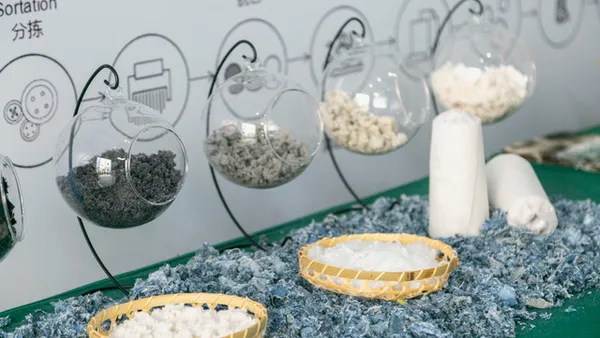Dive Brief:
- As it continues to experiment with alternative materials, Lululemon is releasing its first products made from plant-based nylon, the company said in a press release.
- The shirts were developed in partnership with sustainable materials company Geno, which Lululemon invested in two years ago. The two companies developed the alternative nylon material by replacing the petroleum in the fabric with plants.
- The products — the Plant-Based Nylon Metal Vent and Swiftly Tech Short Sleeve Shirts — have the same lightweight feel as its other apparel, according to Lululemon, and are part of the retailer’s goals to make all of its products with sustainable materials by 2030.
Dive Insight:
Lululemon’s investment in Geno is bearing fruit.
In 2021, Lululemon made an equity investment in the biotech company, which is also backed by businesses like Unilever and L’Oréal. Geno works with companies to formulate more sustainable materials and ingredients for products, and its collaboration with Lululemon has culminated in the release of these two initial plant-based nylon shirts.
“We’ve been working on plant-based nylon with our partner Geno for almost two years, testing ways to integrate this groundbreaking material with our product philosophy of creating products to help our guests feel their best,” Esther Speck, senior vice president of Global Sustainable Business and Impact at Lululemon, said in a statement. “The launch of our first plant-based nylon products is an example of lululemon’s environmental commitments in action, and what’s to come on our journey toward net zero.”
Geno CEO Christophe Schilling praised the effort as “accelerating the sustainable materials transition” and said this was “only the beginning.”
Lululemon’s work with Geno is not the only material innovation the retailer has pursued. In 2021, the company unveiled a yoga mat and two bags made from Mylo, a material constructed from mycelium, the root structure of mushrooms. Lululemon is a founding member of the Mylo consortium, a group of companies that are all investing in material innovation, as the use of mycelium gains greater popularity across the industry.
The retailer touted its plant-based nylon as one of many sustainability initiatives, including a resale program that launched nationwide a year ago.
The retailer saw sales surge 30% in its most recent quarter, reported last month, but home fitness business Mirror is dragging down the company’s results. Although Lululemon just acquired Mirror in 2020, the retailer could be exploring a sale of the business, according to a Bloomberg report.












